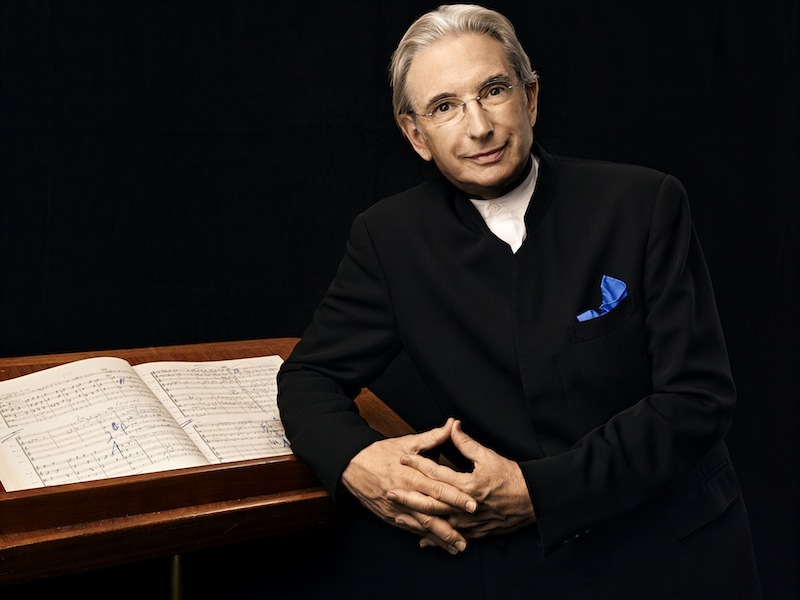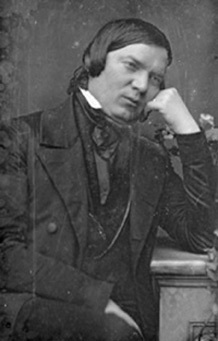New World Symphony serves up an ambitious and illuminating evening of Schumann

Michael Tilson Thomas and the New World Symphony presented “A Schumann Journey” Friday night at New World Center.
The New World Symphony’s annual programs devoted to an overview of the works of a single composer have been consistently fascinating and enlightening, with excellent performances, well prepared.
On Friday night, “A Schumann Journey” proved the most ambitious offering yet in this series. Artistic director Michael Tilson Thomas commented on Robert Schumann’s life and works throughout the three-part program and recorded readings of excerpts from the letters and diaries of Robert and Clara Schumann, Franz Liszt and Joseph Joachim were juxtaposed between the narrative and musical selections. Familiar and less-known chamber, vocal and orchestral scores illustrated the variety and scope of Schumann’s output.
The evening culminated in a highly intense performance of the Symphony No. 4 in D minor. Tilson Thomas noted that Schumann’s orchestrations became increasingly murky and had spawned adjustments and rearrangements almost since the first performances. He added that he and the orchestra had experimented in rehearsal with alterations to the symphony’s instrumental colors and textures. This revised version sounded brighter and bigger, the string lines gaining luster and color and the brassy climaxes registering with greater impact.
The performance’s voltage and momentum never flagged. Even the contrasting lyrical melody in the first movement was imbued with underlying tension. In the second movement Romanza, the oboe solo was played in a straightforward manner, bereft of undue sentimentality. Concertmaster Julia Noone’s soaring tone and elegant phrasing of the solo passages were adroitly blended with the surrounding timbres. The fast tempo of the Scherzo may have set a record, seeming almost devilish in thrust.
The symphony was preceded by the rarely heard overture The Bride of Messina. This eight-minute work finds Schumann at his stormy, romantic zenith. Christian Reif, perhaps the New World’s most gifted conducting fellow to date, led a brisk performance, the textures transparent and dynamics nicely varied.
Earlier in the evening, no less than five pianos were utilized—three on the New World Center’s main platform and two on the auxiliary balcony stages.
Aya Yamamoto may have been the concert’s heroine. She opened the program with strong and agile readings of three of the Papillions. Yamamoto and John Wilson shaped the romantic theme of the Andante and Variations in long phrases. Changes of tempo were smoothly achieved and the duo blended skillfully with cellists Alexa Ciciretti and Ashton Lim and Alexander Love on French horn for a well-gauged reading.
Yamamoto also was a stalwart partner for Joshua Hopkins in four songs from Dichterliebe. The Canadian baritone exhibited a warm timbre and ease at the highest and lowest extremes. His ardent readings of some of Schumann’s greatest lieder had the intimacy of a parlor performance while giving weight and expression to Heinrich Heine’s texts.
A touch of edginess marked a traversal of the final movement of the String Quartet No. 1 in A minor, the music’s nervous energy accentuated. Oboist Max Blair’s sweet tone and flowing tempo in one of the Three Romances avoided the somnolence often imparted to this vignette. Strands of melody in an excerpt from the Fairy Tale Narrations provided a fine showcase for clarinetist Zachary Manzi’s dark coloring
With Tilson Thomas and the orchestra, Hopkins offered a beautiful performance of Dr. Marianus’ description of heaven from Scenes from Goethe’s Faust. Love, Anthony Delivants, David Raschella and Josh Cote scaled the high range and lyrical lines brilliantly in a section from the Konzertstück for Four Horns.
The New World Symphony season continues 7 p.m. Sunday with duo-pianists Christina and Michelle Naughton and the Percussion Consort playing works by Perich, Xenakis and Lansky. nws.edu; 305-673-3331.
Posted in Performances
Leave a Comment
Sat Oct 31, 2015
at 12:28 pm
No Comments







